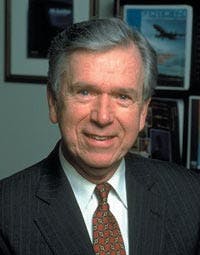SEATTLE - Gerald P. FitzGerald, former head of aviation for the Port Authority of New York & New Jersey and former chair of the American Association of Airport Executives (AAAE), today heads up his own consulting firm, Aviation Perspectives, based in New Fairfield, CT. The high-profile airport veteran met up with AIRPORT BUSINESS at AAAE's annual conference here in May to discuss the state of the airport industry. Here's an edited transcript of that discussion.
During his career, FitzGerald's responsibilities have also included president of Parsons Brinckerhoff Aviation, general manager of JFK International Airport, and various planning, security, financing, and operations management positions.
AIRPORT BUSINESS: The airport industry seems to be scrambling when it comes to funding, the current bond discussion, finding new sources of revenue. Where is it headed?
FitzGerald: It goes back to looking for new sources of capital. When you look at the Terminal 4 project at JFK, it was some billion dollars in expansion money that the Port Authority originally had in its own budget. It ultimately was provided by third-party capital. So that gave them the capacity to spend their money in other areas. I think airports are saying, let's take a look at our capital budget and things that we normally would have done ourselves. Is there some way to take it offline and have someone else do it?
AB: Are there any caveats or caution flags that you see when it comes to public-private investment?
FitzGerald: Yes. You need to be very careful, I think, in pre-judging the willingness of the private capital markets to jump into airports under any conditions. So what do you need to do? What I'm advising people is, once you identify a project and before you write your RFP, have a series of developer conferences, focus groups, sessions, and ask them, how should we shape your request to guarantee the maximum response?
If you talk with some of these developers they'll tell you, give them an environmentally clean slate, for example. Then they'll come in and take responsibility.
Some airports are not accustomed to the length of term that private capital markets would like to see on a transaction. Now, they might not be able to grant that term, but if that's the case, find it out early.
AB: We're currently researching a story on Miami International, where officials have developed an extensive pre-RFP process for some 277 concessions they have pending. Is that the type of pre-planning we're talking about?
FitzGerald: The more time you spend in planning, the more you reduce the risk of failure. People sometimes are eager to get a piece of paper on the street and begin the process. And that's a danger. It seems slower, but information gained in the planning process can save you a lot of time and trouble later on.
The other question besides maximizing revenue is, how do you manage it? Do you really want to bring on the technical expertise at an airport to manage concessions, or do you want a national developer?
AB: There are hybrids out there. SFO's new international terminal is one example, where the airport had both national developer input plus local restaurant participation, which the airport chose to manage.
FitzGerald: It gets back to, how do we maximize revenue and then how do you maximize the value of the land that's out there?
The developer option comes in on both sides. The question is, do you think you have the skill and the expertise to implement this kind of a program, or do you need extra help? Now, airports are not shy in asking for legal help or bond counsel help; but when it comes to asking for help with private developers and other things, they're a little reluctant. There's a bit of reluctance, I think, to engage the private development community in detailed dialog before a concession deal or a capital deal.
AB: Regarding security, one thought currently going around is that ultimately all of the security responsibility at the airport will in time be handed over to the airport, even passenger screening. Any thoughts?
FitzGerald: I think you're right. More and more, TSA will be looking to airports to do it.
AB: After security, the biggest question facing airports today seems to be, How do we operate in the current airline environment?
FitzGerald: There's a definite change in the strategy for airports. In the past the strategy was, you had a mainline legacy carrier, they came into the terminal, signed a 25-year lease, you gave them the space, you went to the bond market and you borrowed and said, I have a 25-year lease here. I'll sell some other gates and it will be fine.
Anything longer than a three-month agreement is not much good with an airline anymore. So what do you do? There's been a change in strategy at many airports - not all - who are saying, we have a local demand that we need to satisfy. That demand will be served by someone. Therefore, we need to take the risk to build the terminal without a long-term lease and to have it equipped on a common use basis.
It's a greater risk for the airport because you can't go to the bond market and say, we have a guarantee with a signed lease for 25 years. But you do go to the bond market and say, we have a consistently growing demand for travel and it's not going away anytime soon. Therefore, you should lend us the money to build the terminal. That is a changed but effective strategy.





